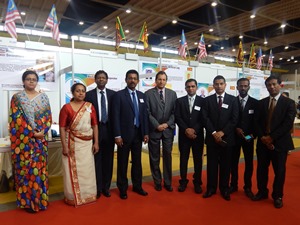
A team of 7 inventors led by Dr. Mahesh Edirisinghe, Commissioner of Sri Lanka Inventors Commission (SLIC) participated at the recently concluded 44th International Inventors Exhibition held from 13-17 April 2016 in Geneva. They have secured 2 Gold Medals with a special recognition from jury for one invention, 3 Silver Medals and 2 Bronze Medals.
Two inventors were fully sponsored by Sri Lanka Inventors Commission (SLIC), having been selected from among the Presidential Award Winners and Sahasak Nimavum Award winners while the other inventors have joined the Sri Lankan delegation on their own expenses.
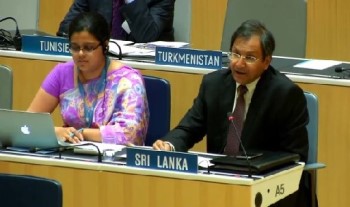
Sri Lanka's Permanent Representative to the UN in Geneva, Ambassador Ravinatha Aryasinha said a IP system has a key role to play in supporting innovation and technology, which are essential components of sustainable development.
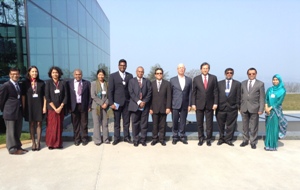
Professor Klaus Schwab, Chairman of the World Economic Forum and
South Asia team leaders with members of the Sri Lanka delegation at the WEF Headquarters in Geneva
Following the participation of Prime Minister Ranil Wickremesinghe and delegation at the World Economic Forum (WEF) Annual Meeting in Davos in January, a Sri Lankan delegation consisting of senior government officials and representatives from the private sector engaged in a two-day follow-up meeting at the World Economic Forum’s headquarters in Geneva. Coordinated by the Permanent Mission of Sri Lanka to the UN in Geneva, the visit was aimed at strengthening the engagement between Sri Lanka and the WEF and to identify specific areas of engagement. The WEF, is the world leading "platform" that brings global political leaders, private sector leaders and thought leaders together to engage, discuss and deliberate and learn from each other.
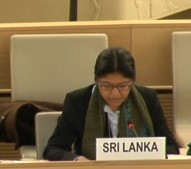
Sri Lanka said “Especially in the context of factually incorrect reference to Sri Lanka in the Report, we welcome the visit of the Special Rapporteur on Minority Issues to Sri Lanka, as such a visit will certainly enable the Special Rapporteur to engage with all concerned in my country to obtain the factual position in this regard and accurate information which will clarify and clear misconceptions pertaining to the areas mentioned in this report”.
Deputy Permanent Representative of Sri Lanka, Mrs. Samantha Jayasuriya made this intervention at the Interactive Dialogue with the Special Rapporteur on Minority Issues under Agenda Item 3 during the 31st Session of the Human Rights Council held at the Palais des Nations on 15 March 2016 in Geneva.
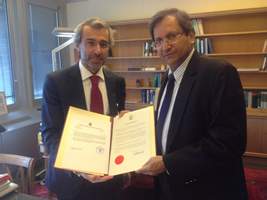
The Instrument of Ratification of the ILO Convention concerning Employment Policy C 122 of 1964 was handed over by Ambassador Ravinatha Aryasinha, Permanent Representative of Sri Lanka to the UN in Geneva to Mr. Georges P. Politakis, Legal Adviser and Director of the Office of Legal Services of the International Labour Organization (ILO) on 3 February 2016.
Sri Lanka is the 110th ILO Member State to have ratified this priority Convention, which is included among the four standards that are the most significant from the viewpoint of governance, giving clear signal of the Government’s commitment to actively promoting full, productive and freely chosen employment, in consultation with the social partners, bilaterally as well through the Colombo Process, the grouping of Asian Contractual Labour Sending Countries, as its Chair-in-Office.
CITES Secretary-General's keynote address on Wildlife and Tourism at Colombo, Sri Lanka.
Good morning and thank you to our colleagues from Sri Lanka Tourism for organizing today’s Public Seminar and for giving me the opportunity to address you.
In particular, I would like to thank and to recognize the Hon. John Amaratunga, Minister of Tourism Development and Christian Affairs, the Hon. Gamini Jayawickrema Perera, Minister for Sustainable Development and Wildlife and their staff.
Questions of how CITES works what CITES is, and is not, are frequently raised by the media and members of the general public and it is a great topic for today’s event.
In the time available, I will touch upon some of the issues that arise most often, and in particular, I will spend some time focusing on wildlife based tourism, which was profiled at a recent World Bank event, and law enforcement, as it is a topic that generates a lot of discussion.
Read More : www.cites.org
Permanent Mission of Sri Lanka
Geneva

Over 2,000 world leaders and economic specialists, including Sri Lankan Prime Minister Ranil Wickremasinghe participated at the inaugural ceremony of the World Economic Forum at Davos in Switzerland on Wednesday (20).
